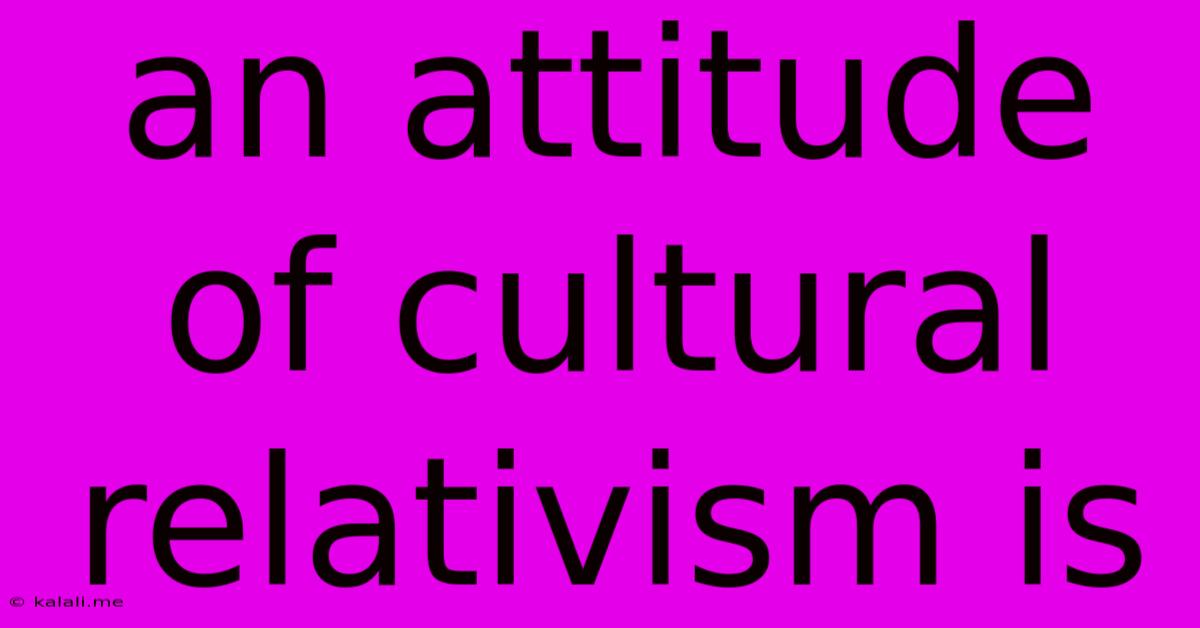An Attitude Of Cultural Relativism Is
Kalali
Jun 15, 2025 · 3 min read

Table of Contents
An Attitude of Cultural Relativism Is: Understanding Diverse Perspectives
Cultural relativism is a complex concept that encourages us to understand a culture on its own terms, rather than judging it based on the standards of our own. It's not about saying all cultures are equally good or bad, but rather about recognizing the validity of different cultural norms and practices within their specific contexts. This article will delve into the core tenets of cultural relativism, its implications, and its ongoing debates.
What is Cultural Relativism?
At its heart, an attitude of cultural relativism is a commitment to understanding different cultures without imposing one's own biases or preconceived notions. It acknowledges that what might seem strange or even morally reprehensible in one culture might be perfectly acceptable, even essential, in another. This doesn't imply moral equivalence; rather, it emphasizes the importance of understanding the reasons behind cultural practices, beliefs, and values. This understanding often requires suspending judgment and embracing empathy, striving to see the world through the eyes of those within the culture being studied.
Key Aspects of a Relativistic Approach:
- Context is Crucial: Cultural relativism stresses the importance of understanding the historical, social, and environmental context in which a culture develops. Practices must be analyzed within their own framework, not judged against external standards.
- Moral Relativity: While not advocating moral nihilism, cultural relativism challenges the idea of universal moral truths. What constitutes "right" or "wrong" can vary significantly across cultures.
- Ethnocentrism Avoidance: A crucial element is actively avoiding ethnocentrism, the tendency to judge other cultures based on the standards and values of one's own culture. Ethnocentrism can lead to misunderstanding, prejudice, and even conflict.
- Empathy and Understanding: Cultural relativism promotes empathy, attempting to understand the perspectives, motivations, and beliefs of individuals within a different culture.
- Open-mindedness: A relativistic approach necessitates open-mindedness and a willingness to question one's own assumptions and biases.
Challenges and Criticisms of Cultural Relativism:
While cultural relativism offers valuable insights into cross-cultural understanding, it's not without its challenges and criticisms. Some argue that:
- Moral Relativism can be problematic: Critics contend that absolute moral relativism could lead to the acceptance of harmful practices, such as human rights violations, simply because they're culturally sanctioned.
- Defining Cultural Boundaries: The boundaries of a culture are often blurry and contested, making it difficult to determine what constitutes a "culture" and whose perspective should be privileged.
- Internal Cultural Diversity: Cultures are not monolithic entities; they contain internal diversity and disagreement. Applying cultural relativism might ignore dissent and conflict within a culture.
- Practical Limitations: Strictly adhering to cultural relativism in all situations might be impractical, especially in instances of cross-cultural conflict or collaboration.
Cultural Relativism in Practice:
Developing a relativistic attitude involves active engagement with diverse perspectives. This includes:
- Engaging with diverse media: Exposure to different cultures through literature, film, music, and art.
- Travel and immersion: Experiencing different cultures firsthand fosters understanding and empathy.
- Critical self-reflection: Regularly examining one's own biases and assumptions is crucial.
- Intercultural dialogue: Engaging in respectful conversations with people from different cultural backgrounds.
Conclusion:
An attitude of cultural relativism is not about moral indifference; it's about striving for a deeper understanding of diverse cultures and challenging our own ethnocentric tendencies. By embracing empathy and critical thinking, we can foster greater cross-cultural understanding and cooperation. While challenges remain, the pursuit of cultural relativism remains a vital tool for navigating our increasingly interconnected world.
Latest Posts
Latest Posts
-
What Is The Sum Of The First Five Prime Numbers
Jun 15, 2025
-
Noncellular Infectious Protein Particles Are Called
Jun 15, 2025
-
Lcm Of 9 And 12 And 15
Jun 15, 2025
-
Difference Between A Democracy And A Dictatorship
Jun 15, 2025
-
Which One Of The Following Statements Best Represents An Algorithm
Jun 15, 2025
Related Post
Thank you for visiting our website which covers about An Attitude Of Cultural Relativism Is . We hope the information provided has been useful to you. Feel free to contact us if you have any questions or need further assistance. See you next time and don't miss to bookmark.